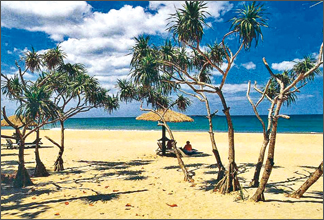Tourism, an implicit aid in counter propaganda
Vipula WANIGASEKERA
In tourism, attention is usually focused on direct tangible results
in terms of foreign receipts, employment and the level of support
services such as entertainment, shopping etc. This is normal for a well
blended product - service combination like tourism, particularly when it
generates nearly a billion international tourist arrivals with receipts
over USD 850 billion (in 2007) globally.
|

Nilaweli beach, a haven for tourists with the dawn of peace |
The stream of indirect benefits of tourism into an economy is also
enormous. To ascertain the real impact of indirect benefits calls for an
intense research which some countries have succeeded in carrying out the
outcome of which have enabled the authorities to justify diverting more
funds into their tourism campaigns. This write up is to touch on an
attribute of tourism in countering adverse publicity on Sri Lanka which
is currently at its peak. To see this prospect in its true viewpoint,
tourism should be seen beyond its known definition which reads "travel
to and stay in places outside their usual environment for more than
twenty-four hours".
The contribution of tourism in image correction and image building
efforts cannot be measured in terms of money. If one considers this
aspect in an overall plan of action for countering bad publicity,
tourism will compliment all the endeavours, as an image issue without
substantial evidence, is a basic communication problem.
Among the determinants of countering adverse publicity are the
understanding of the communication issue, finding out the roots of bad
publicity, identifying the opinion makers, developing the right
messages, getting the exposure from the desired media and reaching out
to the target audiences. Of the modes of communication, word of mouth
reporting by independent sources leads the rest due to the credibility
factor.
Fighting harmful media reporting has been a challenge for the Sri
Lankan Government for decades, successful conduct of which had been
tilting on the scale from time to time. The need to drive this process
is now felt more than ever before, when the final battle against
insurgency is now seen as the light at the end of the tunnel and the
long awaited economic development calls for foreign investments.
The common belief on 'head on' or direct counteractions have their
merits no doubt. Strategists on the subject however point out the
effectiveness of indirect approaches that could bring in more desired
results because such methods carry more integrity. Tourism does exactly
that.
Egypt receives well over 11m tourists with an annual growth of 11 per
cent and this is a country where tourists were deliberately targeted and
killed. Such massacres were recorded in Egypt regularly almost every
year. If one studies the mode of communication Egypt has worked on to
sustain growth, it is nothing but tourism itself !. (Princess Diana was
one tourist in the early 90s who shared her experience and that had a
huge boost on their publicity campaign for several years thereafter.)
In geographic segmentation of the markets for Sri Lanka tourism, at
least in four countries viz UK, Germany, France and India. Sri Lanka
needs to fight adverse propaganda and convince the audiences of what is
really going on here. The term ' civil war' has damaged the image of Sri
Lanka considerably but tourists can effectively quash such versions when
they return after a memorable experience.
Travel writers, tour operators, holiday makers, incentive travellers
and business and conference delegates are all foreigners who are members
of the target audience in tourism promotional campaigns. The ' seeing,
being, doing ' they relate to their countrymen carries the highest
credibility over what the Sri Lankans themselves could report through
advertising and press releases.
The messages so carried by them are considered dependable. The
attractions and locations from golden beaches to fertile greenery,
adventure safaris, wildlife and the heritage running back to over two
thousand years become dreams in the minds of the potential travellers
who would want to realize them.
Tourism should therefore be reckoned as a primary tool in
communication that can offset negative publicity, deliberately or
otherwise generated in countries that are important to Sri Lanka. At a
time a new brand of Sri Lanka Tourism is poised to be launched followed
by a communication campaign, it is necessary for other authorities to
ride on the powerful messages that the campaign would entail.
The authorities of many international bodies have their agendas and
political compulsions when reporting the situation in Sri Lanka. Damage
caused by them to Sri Lanka has so far been colossal. Sri Lanka on the
other hand can depend on the innocent tourists who stood by the Sri
Lankans, sometimes with repeat holidays, year after year, and they would
carry the message that Sri Lanka is safe for investment and tourism.
An appeal to them for this favour would not go waste and they would
only be happy to do so.
|



